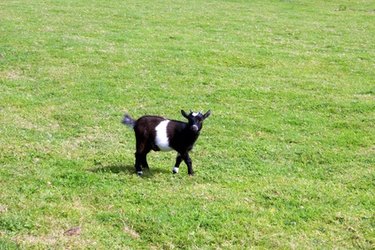Things You'll Need
3-foot square compost bin
Goat manure
Kitchen scraps
Shredded cardboard
Dry grass clippings
Chopped leaves
Straw
Shovel
Burlap bag
5-gallon bucket

Composting rich ‘hot’ goat manure is similar to composting any other animal waste. Goat manure added directly to a garden in the fall makes wonderful compost. It also can be added to other scraps in the compost bin or used to make manure tea. Composting is the natural breakdown of organic material to a dark, loose, soil-like substance that will substantially enrich any garden, according to the Environmental Defense Fund. It is a form of recycling that occurs continually in nature and can significantly reduce the amount of household waste. Try your hand at one of these composting methods and your plants and garden will love it.
Step 1
Make or build a compost bin. Contact a goat farmer and arrange to have the manure delivered to the bin.
Video of the Day
Step 2
Layer the goat manure with kitchen scraps and/or soil, shredded cardboard, dry grass clippings, chopped leaves or straw. Add just enough water to keep it moist, and layer until the compost bin is full. Turn the pile from top to bottom approximately every two to five days.
Step 3
Put 10 to 12 lbs. of goat manure per 100 square feet of garden in the fall after harvesting all produce.Turn the manure and mix with the soil in the spring, using a garden tiller.
Step 4
Make manure tea. Place a shovelful or two of goat manure in a burlap bag. Tie the bag closed with string. Place the manure-filled bag in a 5-gallon bucket and fill with water. Allow the bag to sit for a week to 10 days. Mix one part manure tea to 10 parts water for use on a daily basis.
Warning
Do not allow any manure tea to get on foliage of the plants.
Video of the Day
- USA Gardner: International gardening guide
- Center for Ecological Technology: How to make healthy compost
- ComposBins: Building a composting bin
- University of Arkansas: Composting
- Enviromental Defense Fund: What is composting
- Do It Yourself: How to make compost tea
- Yodle Consumer Guide: Fertilize your vegetable garden with natural materials